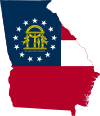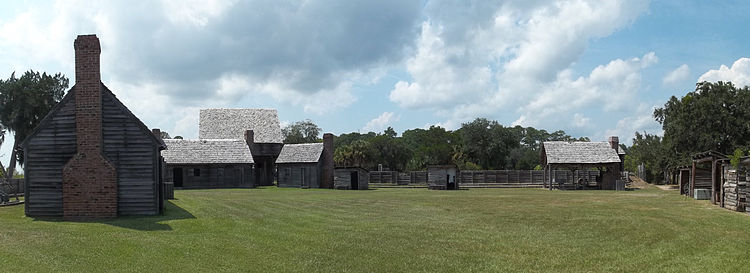The Georgia (U.S. state) PortalGeorgia /ˈdʒɔːrdʒə/ ⓘ is a state located in the southeastern United States. It was established in 1732, the last of the original Thirteen Colonies. Named after King George II of Great Britain, Georgia was the fourth state to ratify the United States Constitution, on January 2, 1788. It declared its secession from the Union on January 21, 1861, and was one of the original seven Confederate states. It was the last state to be restored to the Union, on July 15, 1870. Georgia is the 24th most extensive and the 8th most populous of the 50 United States. From 2007 to 2008, 14 of Georgia's counties ranked among the nation's 100 fastest-growing, second only to Texas. Georgia is known as the Peach State and the Empire State of the South. Atlanta is the state's capital and its most populous city. Georgia is bordered on the south by Florida; on the east by the Atlantic Ocean and South Carolina; on the west by Alabama; and on the north by Tennessee and North Carolina. The northern part of the state is in the Blue Ridge Mountains, a mountain range in the vast Appalachian Mountains system. The central piedmont extends from the foothills to the fall line, where the rivers cascade down in elevation to the continental coastal plain of the southern part of the state. The highest point in Georgia is Brasstown Bald, 4,784 feet (1,458 m); the lowest point is the Atlantic Ocean. Georgia is the most extensive state east of the Mississippi River in terms of land area, although it is the fourth most extensive (after Michigan, Florida, and Wisconsin) in total area, a term which includes expanses of water which are part of state territory.
Selected article -Providence Canyon State Outdoor Recreation Area is a 1,003 acres (4.06 km2; 1.57 sq mi) state park located in Stewart County in southwest Georgia. The park contains Providence Canyon, which is sometimes called Georgia's "Little Grand Canyon". It is considered to be one of the Seven Natural Wonders of Georgia. Providence Canyon actually is not a purely natural feature — the massive gullies (the deepest being 150 feet) were caused by erosion due to poor farming practices in the 19th century. It is also home to the very rare plumleaf azalea. The park lies on marine sediments—usually loamy or clayey, with small areas of sand. Loamy sand topsoils overlie subsoils of sandy clay loam, sandy clay, or clay in most of the uneroded section. Nankin, Cowarts, Mobila, and Orangeburg are the most prominent soil series. The canyons have much exposure of clay, over which water often seeps. Water is mobile in this well drained area. One of the quirkier attractions of the state park is an abandoned homestead including nearly a dozen rusty, 1950s-era cars and trucks. Due to the environmental damage that removing the vehicles would cause, park officials have decided to leave them alone. Selected picture - Credit: Ken Lund
The Georgia Dome was a domed stadium in the southeastern United States, currently under demolition. Located in Atlanta, Georgia, between downtown to the east and Vine City to the west, it was owned and operated by the State of Georgia as part of the Georgia World Congress Center Authority. Its successor, Mercedes-Benz Stadium, was built adjacent to the south and opened in August 2017. State facts
State symbols:
Selected biography -Jimmy Carter (born October 1, 1924) is an American politician who served as the 39th President of the United States (1977–1981) and was the recipient of the 2002 Nobel Peace Prize, the only U.S. President to have received the Prize after leaving office. He took office during a period of international stagflation, which persisted throughout his term. The end of his presidential tenure was marked by the 1979–1981 Iran hostage crisis, the 1979 energy crisis, the Three Mile Island nuclear accident, the Soviet invasion of Afghanistan (at the end of 1979), 1980 Summer Olympics boycott by the United States of the Moscow Olympics and the 1980 eruption of Mount St. Helens. He survived a primary challenge against Ted Kennedy for the Democratic Party nomination in the 1980 election, but lost the election to Republican candidate Ronald Reagan. After leaving office, Carter and his wife Rosalynn founded the Carter Center in 1982, a nongovernmental, not-for-profit organization that works to advance human rights. He has traveled extensively to conduct peace negotiations, observe elections, and advance disease prevention and eradication in developing nations. Selected anniversaries for April
Did you know -
CategoriesSelect [►] to view subcategories
WikiProjects
What are WikiProjects? Selected panoramaCredit:
Ebyabe
Fort King George was a fort located in the U.S. state of Georgia. The fort was built in 1721 along the Altamaha River and served as the southernmost outpost of the British Empire in the Americas until 1727. The fort was constructed in what was then considered part of the colony of South Carolina, but was territory later settled as Georgia. It was part of a defensive line intended to encourage settlement along the colony's southern frontier, from the Savannah River to the Altamaha River. Great Britain, France, and Spain were competing to control the American Southeast, especially the Savannah-Altamaha River region. Selected quoteQuality content
Featured articles
Featured lists
Featured pictures
TopicsThings you can doRelated portalsAssociated WikimediaThe following Wikimedia Foundation sister projects provide more on this subject:
Discover Wikipedia using
portals |





























